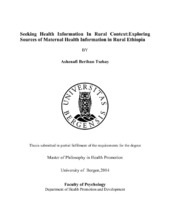| dc.description.abstract | In Ethiopia, the levels of maternal mortality and morbidity is among the highest in the world. However, many of these deaths and injuries could be prevented if they are properly communicated with interventions that are currently available. The motivation for researching in this area comes from an interest in contributing to further understanding of the convenient sources of maternity information that promotes the health needs of the community. This study is relevant in the current health communication context of Ethiopia because many local and international organizations are working and have an interest in promoting maternal health in rural areas. Therefore , having a clear understanding of how rural women obtain information about maternal health may help those communicating to target women more successfully. Additionally, it would help to sustainably improve the overall maternal health communication dynamics. This study has been thus conducted to explore the maternal health information sources of rural women residing in five rural villages of Ethiopia. It further examines factors that motivates and impedes women to seek information and barrier encounter in the process of information dissemination, seeking and usage. The qualitative research paradigm has been used and focus group discussions and in-depth interviews were utilized. The focus group discussions were used to get a substantial amount of information on the rural women's' sources of information and views as the group dynamics helps to create active discussions. The in- depth interviews were also utilized to understand and explore lived experiences, attitudes on information disseminations and usage. The study found out that lack of knowledge, perceived personal risk of health complications , and seeking a healthy life are the major factors that motivates women to seek for information. The study further documents women have sought and used various kinds of interpersonal and media related sources to satisfy their maternity information needs during the course of their reproductive life. Of all maternity sources, health extension workers and health professionals were found to be the most commonly used and trusted sources of information. Illiteracy , attitude and perception towards information providers and ignorance related traditional and cultural barriers were identified as the major bottlenecks of information dissemination , seeking and usage. | en_US |
